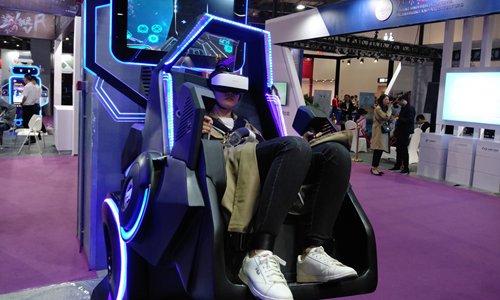
A visitor experiences virtual reality (VR) on October 21 at the 2019 World Conference on the VR Industry in Nanchang, East China's Jiangxi Province. Photo: Li Qiaoyi/GT
Unease over a trade tension-fueled technological decoupling is expected to serve as a continual impetus for China's 5G technology push, a promising area to deploy capital amid a slowing economy, investors and industry participants said Monday during a virtual reality (VR) conference.
While the 5G optimism is unanimous, views are mixed on which parts of the technology, ranging from infrastructure to a variety of 5G-powered apps such as VR and augmented reality (AR), currently appeal the most to investors.
With two out of the three traditional carriages that move the economy losing steam, indicating the need for new growth engines, 5G is definitely a promising investment area, said Lu Jiaqing, managing director of Beijing-based venture capital firm Cash Capital, while speaking Monday at a sub-forum on industry investment and finance at the 2019 World Conference on VR Industry in Nanchang, capital of East China's Jiangxi Province.
Official statistics indicate consumption is largely a growth stabilizer while investment and net exports have failed to boost the economy like they once did.
More importantly, the drive for indigenous technology has been fueled by China-US tensions. The unease over technological decoupling will linger even if a deal is signed, providing a continual impetus for homegrown 5G technology, Lu said.
Building indigenous strength in core segments like chipsets will still require time, said Lu, a former deputy general manager of the tech investment arm of China Telecom, one of the country's three telecom operators.
"The rollout of 5G made me feel thrilled," said Tan Min, CEO of Guangzhou guju network technology.
Tan stressed how some industries that once grappled with complaints over unsatisfactory user experience in the pre-5G era such as VR and AR realms would embrace new growth opportunity thanks to the arrival of 5G.
Opinions, however, have varied over which segments are most investment-worthy in the 5G era.
With 5G infrastructure under construction, now is the time to invest in businesses concerning 5G development such as optical communications devices, Lu told the Global Times on Monday.
According to figures revealed Monday at the annual World Internet Conference in Wuzhen, East China's Zhejiang Province, the country's three telecom carriers had opened 86,000 5G base stations as of September and over 130,000 5G base stations will be operational by year's end.
"5G applications won't be the current priority in terms of investment, although I believe they will thrive in light of China's leading position in the global app space since the advent of the mobile internet era," he said.
Despite the hype, now is not the right time for capital to be deployed in VR and AR at large, the investment veteran said.
The lack of enthusiasm on rushing into investing in virtual worlds is not uncommon in the financial community.
Technological advancements alone are not enough to power industry development, said Zhou Qi, managing partner of GSR United Capital, highlighting the importance of demand that would play a decisive role in fanning creative sparks for innovation.
5G allows for fast internet transmission and low latency, which supposedly addresses the primary issues with VR popularity, but explosive growth has yet to reveal itself on the horizon, he said, adding that gaming is expected to be a primary part of the VR sector, but there remains no "killer" VR games.
Defending the investment-worthiness of 5G applications, notably those enabled by VR and AR, Wu Fei, CEO and founder of Beijing LLvision Technology, said that while 5G has yet to be fully monetized, the nation's heftier push for tech prowess amid the trade war will likely give rise to various applications in the 5G era.
VR has already been successfully applied in sectors like healthcare, security, and manufacturing and it is likely a killer VR-powered app could surprise the market, thereby making VR devices as popular as smartphones in today's society, Wu told the Global Times.
"The availability of more funding conduits in the country, notably the STAR Market in Shanghai, has offered domestic tech companies stellar financing dividends," he said Monday.
VR investment rebounded last year after hitting low levels in 2017, according to Song Yu, vice president of CCID Consulting. During the sub-forum, Song revealed that the rebound became more apparent this year and the VR sector is once again on a fast track, owing to substantial support from governments at all levels and the start of 5G commercial acceptance.




